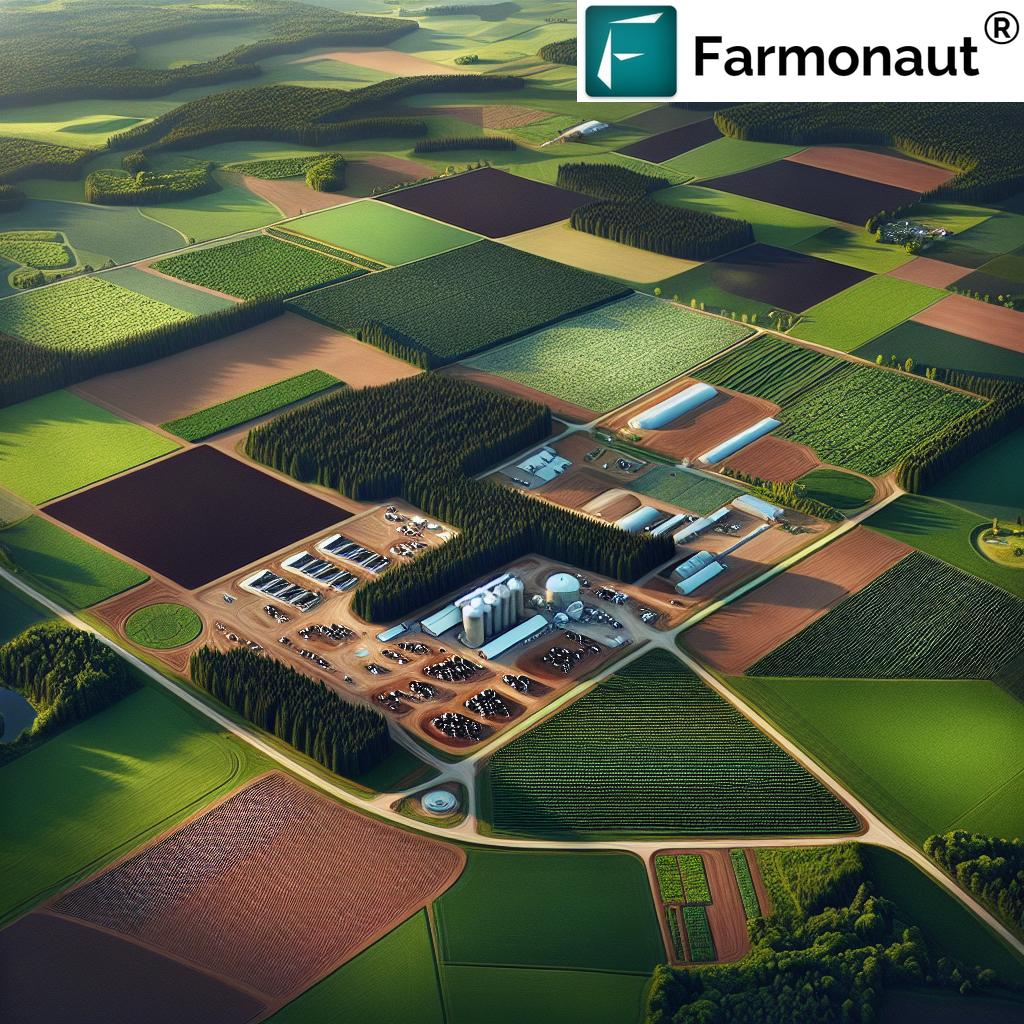West Michigan’s SOAR Initiative: Connecting Students with Agribusiness Professionals for Agricultural Literacy
“SOAR program in West Michigan has engaged 1,273 students across 54 classrooms, promoting agricultural literacy in K-5 education.”
We at Farmonaut are excited to share with you an innovative program that’s taking root in West Michigan’s educational landscape. The Spotlight on Ag Readers (SOAR) initiative is bridging the gap between classrooms and the vital world of agriculture, fostering agricultural literacy among young learners. As advocates for agricultural technology and education, we believe programs like SOAR are essential in shaping the future of our industry.
Understanding the SOAR Initiative
The SOAR program, organized by West Michigan Works! Agribusiness Talent Council, is a groundbreaking effort to bring Michigan’s second-largest industry to life for K-5 students. This initiative invites farmers, food processors, and growers to volunteer in classrooms during National Agriculture Month, providing young minds with a firsthand look at the diverse and dynamic world of agribusiness.

As we delve deeper into the SOAR initiative, it’s important to note that while Farmonaut is not directly involved in this program, we fully support such educational endeavors. Our mission aligns with SOAR’s goals of promoting agricultural literacy and connecting the next generation with the vast opportunities in the agribusiness sector.
The Impact of SOAR on West Michigan Agriculture
West Michigan agriculture programs like SOAR are making significant strides in fostering agricultural literacy and connecting students with the industry. Let’s explore the multifaceted impact of this initiative:
- Enhancing Agricultural Literacy: By bringing real-world agricultural professionals into classrooms, SOAR is helping students understand the importance of agriculture in their daily lives.
- Showcasing Career Opportunities: The program highlights the diverse Michigan agribusiness opportunities available to students, from dairy farming to forestry.
- Bridging the Urban-Rural Divide: SOAR helps urban and suburban students connect with the rural agricultural community, fostering a greater understanding of where their food comes from.
- Supporting Local Economy: By showcasing the agricultural economy in Michigan, SOAR helps students appreciate the economic significance of this sector in their region.
As we at Farmonaut continue to innovate in the field of agricultural technology, we recognize the importance of programs like SOAR in cultivating the next generation of agricultural professionals and enthusiasts.
The Diversity of West Michigan’s Agricultural Landscape
SOAR’s initiative encompasses a wide range of agricultural sectors, reflecting the rich diversity of West Michigan’s agricultural economy. From dairy farming to apple growing, and from forestry to nursery industries, the program offers students a comprehensive view of the region’s agricultural tapestry.
Dairy Farming in West Michigan
West Michigan dairy farming is a significant contributor to the state’s agricultural output. The SOAR program brings dairy farmers into classrooms, allowing students to learn about:
- Modern milking techniques and technology
- The journey of milk from farm to table
- The nutritional importance of dairy products
- Sustainable practices in dairy farming
This hands-on exposure helps students understand the complexity and importance of the dairy industry in their region.
The Thriving Michigan Apple Growing Industry
Michigan is renowned for its apple production, and the SOAR initiative ensures that students grasp the significance of this industry. Apple growers participating in the program share insights on:
- Different apple varieties grown in Michigan
- The apple growing cycle and harvesting techniques
- The economic impact of apple production on the local economy
- Innovations in apple farming and storage
By connecting students with apple growers, SOAR is planting the seeds for future innovations in this crucial sector.
Forestry and Nursery: The Green Backbone of Michigan
The Michigan forestry and nursery industry plays a vital role in the state’s economy and ecosystem. Through SOAR, students learn about:
- Sustainable forest management practices
- The importance of trees in maintaining ecological balance
- Career opportunities in forestry and arboriculture
- The role of nurseries in urban landscaping and agriculture
This exposure to the green sector of agriculture broadens students’ understanding of the industry beyond traditional farming.
The Process of Agricultural Education for Students
The SOAR initiative employs a multifaceted approach to agricultural education for students. Here’s how the program typically unfolds in classrooms:
- Interactive Reading Sessions: Volunteers spend 45 minutes reading agriculture-focused books to students, bringing the subject to life through storytelling.
- Q&A Segments: Students have the opportunity to ask questions directly to agricultural professionals, satisfying their curiosity about farming and food production.
- Hands-On Activities: When time permits, volunteers lead engaging activities that give students a taste of agricultural work.
- Resource Sharing: Each classroom receives a National Agriculture Foundation book, leaving a lasting educational resource for future learning.
This comprehensive approach ensures that students not only learn about agriculture but also experience it in a meaningful way.

At Farmonaut, we believe in the power of education and technology to transform agriculture. While our focus is on providing advanced farm management solutions, we applaud initiatives like SOAR that lay the groundwork for future agricultural innovation.
“Michigan’s agriculture industry, the state’s second-largest, is showcased through SOAR in three counties: Montcalm, Ottawa, and Muskegon.”
The Growing Reach of SOAR
The SOAR initiative has seen impressive growth since its inception. Let’s take a closer look at its current reach and impact:
| County | Participating Classrooms | Students Reached | Types of Agribusiness Professionals | Key Agricultural Sectors |
|---|---|---|---|---|
| Montcalm | 18 | 425 | Dairy Farmers, Christmas Tree Farmers | Dairy, Forestry |
| Ottawa | 22 | 520 | Apple Growers, Nursery Growers | Fruit Production, Horticulture |
| Muskegon | 14 | 328 | Food Processors, Forestry Professionals | Food Processing, Timber |
| Total | 54 | 1,273 | Diverse representation across major agricultural sectors | |
This table illustrates the significant impact SOAR is having across West Michigan, reaching a diverse array of students and representing various facets of the agricultural industry.
The Role of Technology in Modern Agriculture
While SOAR focuses on introducing students to traditional agricultural practices, it’s crucial to highlight the growing role of technology in modern farming. At Farmonaut, we’re at the forefront of this technological revolution in agriculture.
Our satellite-based farm management solutions offer farmers advanced tools for:
- Real-time crop health monitoring
- AI-based advisory systems
- Blockchain-based traceability
- Resource management optimization
These technologies are transforming the way farmers work, making agriculture more efficient, sustainable, and productive.
Explore Farmonaut’s innovative solutions:
The Importance of Agricultural Literacy for Kids
Agricultural literacy for kids is more than just understanding where food comes from; it’s about cultivating an appreciation for the complex systems that sustain our society. The SOAR initiative recognizes this and aims to:
- Develop critical thinking skills about food and natural resources
- Foster environmental stewardship
- Encourage healthy eating habits
- Inspire future careers in agriculture and related fields
By introducing agricultural concepts at a young age, SOAR is helping to create a more informed and engaged generation of consumers and potential agricultural professionals.
West Michigan Food Processing Careers: A Growing Opportunity
The SOAR program also sheds light on the diverse West Michigan food processing careers available in the region. This sector is a vital component of the agricultural economy, offering numerous opportunities for future employment. Students learn about:
- The journey of food from farm to processor to table
- Innovative food preservation techniques
- Quality control and food safety measures
- The role of technology in modern food processing
By exposing students to these career paths, SOAR is helping to secure the future of Michigan’s food processing industry.
The Future of Agriculture in West Michigan
As we look to the future, the SOAR initiative plays a crucial role in shaping the agricultural landscape of West Michigan. By fostering agricultural literacy and connecting students with industry professionals, the program is:
- Ensuring a steady pipeline of future agricultural professionals
- Promoting sustainable farming practices
- Encouraging innovation in agricultural technology
- Strengthening the connection between urban and rural communities
At Farmonaut, we’re excited to see how these young minds, inspired by programs like SOAR, will drive innovation in agriculture. Our commitment to making precision agriculture accessible aligns perfectly with the goals of agricultural education initiatives.
Discover how Farmonaut is revolutionizing farming: Explore our API
Collaboration Between Education and Industry
The success of the SOAR initiative highlights the importance of collaboration between educational institutions and the agricultural industry. This partnership benefits both sectors by:
- Providing students with real-world insights into agriculture
- Offering industry professionals a platform to share their knowledge and passion
- Creating a feedback loop that informs curriculum development
- Fostering community engagement and support for local agriculture
As technology continues to reshape agriculture, programs like SOAR will play an increasingly important role in preparing the next generation for the challenges and opportunities ahead.
The Role of Technology in Agricultural Education
While SOAR focuses on in-person interactions, the integration of technology in agricultural education is becoming increasingly important. At Farmonaut, we believe that exposing students to agricultural technology can:
- Enhance their understanding of modern farming practices
- Spark interest in STEM careers within agriculture
- Prepare them for the digital future of farming
- Demonstrate the intersection of technology and sustainability in agriculture
For developers interested in agricultural technology: Check out our API Developer Docs
The Economic Impact of Agricultural Education
Initiatives like SOAR have a ripple effect on the agricultural economy in Michigan. By fostering interest and understanding of agriculture from a young age, these programs contribute to:
- A more skilled and knowledgeable workforce for the agricultural sector
- Increased local support for agricultural businesses
- Greater innovation and entrepreneurship in agriculture
- Enhanced food security and sustainability in the region
The long-term economic benefits of agricultural education programs are substantial, making initiatives like SOAR invaluable investments in the future of Michigan’s agricultural industry.
Challenges and Opportunities in Agricultural Education
While programs like SOAR are making significant strides, there are still challenges in agricultural education that need to be addressed:
- Keeping pace with rapidly evolving agricultural technologies
- Addressing misconceptions about modern farming practices
- Ensuring equal access to agricultural education across urban and rural areas
- Integrating agricultural literacy into standard curricula
These challenges also present opportunities for innovation in educational approaches and for closer collaboration between educators, industry professionals, and technology providers like Farmonaut.
The Global Context of Agricultural Education
While SOAR is a local initiative, it’s part of a global movement towards improved agricultural literacy. Around the world, similar programs are working to:
- Address food security challenges
- Promote sustainable farming practices
- Prepare for the impacts of climate change on agriculture
- Foster international collaboration in agricultural research and education
By participating in these educational initiatives, students in West Michigan are joining a global community of future agricultural innovators and leaders.
The Role of Policy in Supporting Agricultural Education
The success of programs like SOAR often depends on supportive policies at local, state, and national levels. Policymakers can contribute to the growth of agricultural education by:
- Allocating resources for agricultural literacy programs
- Integrating agriculture into STEM education initiatives
- Creating incentives for schools to partner with local agricultural businesses
- Supporting research on the long-term impacts of agricultural education
As advocates for agricultural innovation, we at Farmonaut encourage policymakers to recognize the vital role of agricultural education in securing a sustainable future for the industry.
The Future of SOAR and Similar Initiatives
Looking ahead, we anticipate that programs like SOAR will continue to evolve and expand. Potential developments might include:
- Integration of virtual and augmented reality technologies for immersive learning experiences
- Expansion to middle and high school levels
- Development of year-round programming beyond National Agriculture Month
- Creation of mentorship programs linking students with agricultural professionals
These advancements will further enhance the impact of agricultural education initiatives, preparing students for the complex and exciting future of agriculture.
Frequently Asked Questions
Q: What is the SOAR initiative?
A: SOAR (Spotlight on Ag Readers) is a program organized by West Michigan Works! Agribusiness Talent Council that brings agricultural professionals into K-5 classrooms to promote agricultural literacy.
Q: How can agricultural professionals participate in SOAR?
A: Farmers, food processors, and growers can volunteer to spend 45 minutes in a classroom, reading an agriculture-focused book, answering questions, and leading activities.
Q: What counties are currently involved in the SOAR program?
A: The program is active in Montcalm, Ottawa, and Muskegon counties in West Michigan.
Q: How does SOAR benefit students?
A: SOAR helps students understand the importance of agriculture, learn about career opportunities in the field, and connect with real-world agricultural professionals.
Q: Can technology play a role in agricultural education programs like SOAR?
A: Yes, while SOAR focuses on in-person interactions, technology can enhance agricultural education by providing virtual experiences, data analysis tools, and exposure to modern farming techniques.
Conclusion
The SOAR initiative in West Michigan is a shining example of how agricultural education can bridge the gap between classrooms and the vital world of agriculture. By connecting students with agribusiness professionals, SOAR is not only fostering agricultural literacy but also planting the seeds for the future of Michigan’s agricultural industry.
At Farmonaut, we’re inspired by programs like SOAR and their commitment to educating the next generation about the importance of agriculture. While our focus is on providing cutting-edge technological solutions for farmers, we recognize that the future of agriculture depends on knowledgeable, passionate individuals who understand the complexities and opportunities within the field.
As we look to the future, we envision a world where agricultural literacy is widespread, where technology and traditional farming practices work hand in hand, and where initiatives like SOAR continue to inspire young minds to explore the endless possibilities in agriculture.
Together, through education, innovation, and collaboration, we can ensure a bright and sustainable future for agriculture in West Michigan and beyond.
Earn With Farmonaut: Join our Affiliate Program
Earn 20% recurring commission with Farmonaut’s affiliate program by sharing your promo code and helping farmers save 10%. Onboard 10 Elite farmers monthly to earn a minimum of $148,000 annually—start now and grow your income!







